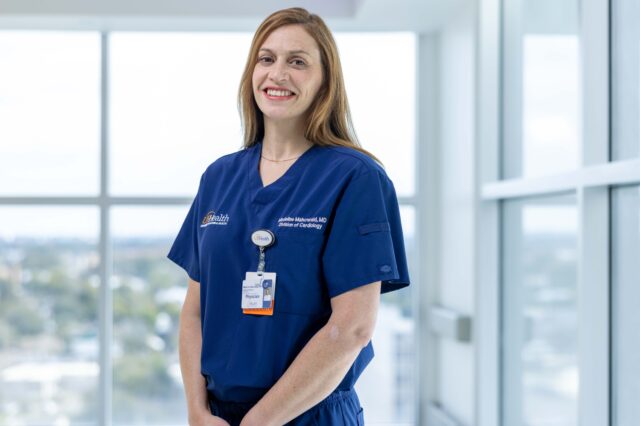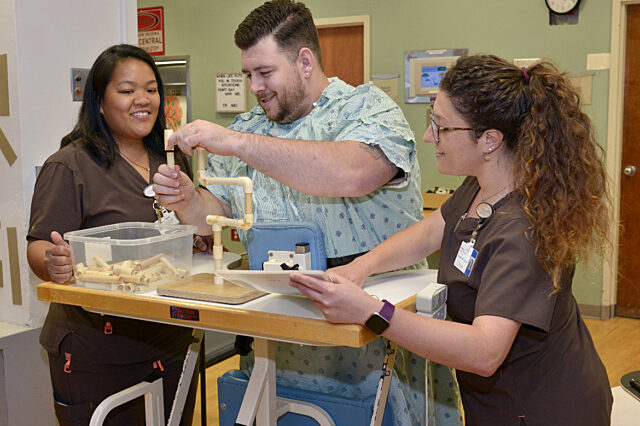Ask the Doctor: Is taking an aspirin every day good for my heart health?
We posed this question to Madeline Mahowald, MD, a University of Florida assistant professor of medicine and a board-certified interventional cardiologist at…

Update your location to show providers, locations, and services closest to you.
A stroke is the loss of brain function due to a disturbance in the brain’s blood supply. It causes an incredible 2 million neurons to die every minute. That’s why time is so critical after someone has a stroke.
Since every second counts, the UF Health Comprehensive Stroke Program team can mobilize around the clock to diagnose and stabilize stroke patients, minimizing the risk of permanent disability and preserving quality of life.
In the United States, about 800,000 people suffer from strokes every year, and nearly a quarter of strokes occur in people who have had one before. It is the leading cause of acquired physical disability in American adults, and the fourth leading cause of death. Northeast Florida is on the southeastern edge of a region referred to as the “Stroke Belt,” where strokes are most common in the U.S.
A stroke can be caused by ischemia, which is the lack of blood flow commonly due to a clot, or a hemorrhage from burst or bleeding blood vessels in or around the brain. Maintaining control over high blood pressure, heart disease, diabetes, and high cholesterol — and keeping them under control — will greatly reduce your chances of having a stroke. Smoking is also a risk factor.

Some signs someone is having a stroke include:
A stroke is a medical emergency that requires immediate attention. If you experience any of these signs, call 911.

The UF Health Comprehensive Stroke Program provides inpatient and outpatient services for the diagnosis, management and rehabilitation of stroke patients. Such integrated and sophisticated care is important because research shows that patients improve faster and recover more completely when managed in a dedicated stroke facility.
Our program has received accreditation from the Agency for Health Care Administration as a Comprehensive Stroke Center.
Our approach features state-of-the-art methods for the treatment of stroke, such as the clot-busting drug tPA (tissue plasminogen activator) and interventional procedures. An interdisciplinary team of University of Florida physicians and specially trained UF Health Jacksonville staff includes experts in neurology, neurosurgery, vascular surgery, neuroradiology, emergency medicine, medical intensive care and rehabilitation services. The program also encompasses educational and support group programs for stroke patients.
UF Health Jacksonville was among the first hospitals in the nation to use an air emergency service to transport stroke patients. Prompt transport by TraumaOne helicopter to the UF Health Jacksonville Comprehensive Stroke Program can improve a patient's outcome by decreasing medical complications and lowering the risks of mortality. Stroke patients in Duval County and 12 surrounding counties (including Baker, Bradford, Clay, Nassau, Putnam, St. Johns, Union, Camden and Chariton), as well as Camden County, Georgia, benefit from this rapid transport service.

In 2023, U.S. News & World Report recognized UF Health in Jacksonville as high performing in the care of patients with stroke.





Our community and patient programs provide great value to patients, families and loved ones. People can find support, educational materials, expert consultants and more. In most instances, these programs are offered free of charge.
Tai chi classes for patients and caregivers with neurologic conditions such as Parkinson's, stroke, multiple sclerosis, epilepsy and neuropathy.
Yoga classes for patients and caregivers with neurology conditions such as Parkinson's, stroke, multiple sclerosis, epilepsy and neuropathy.
We posed this question to Madeline Mahowald, MD, a University of Florida assistant professor of medicine and a board-certified interventional cardiologist at…

Acute-inpatient rehab services can help a patient recover from stroke, brain injury, spinal cord injury, neurological disorders or other injuries that have…
